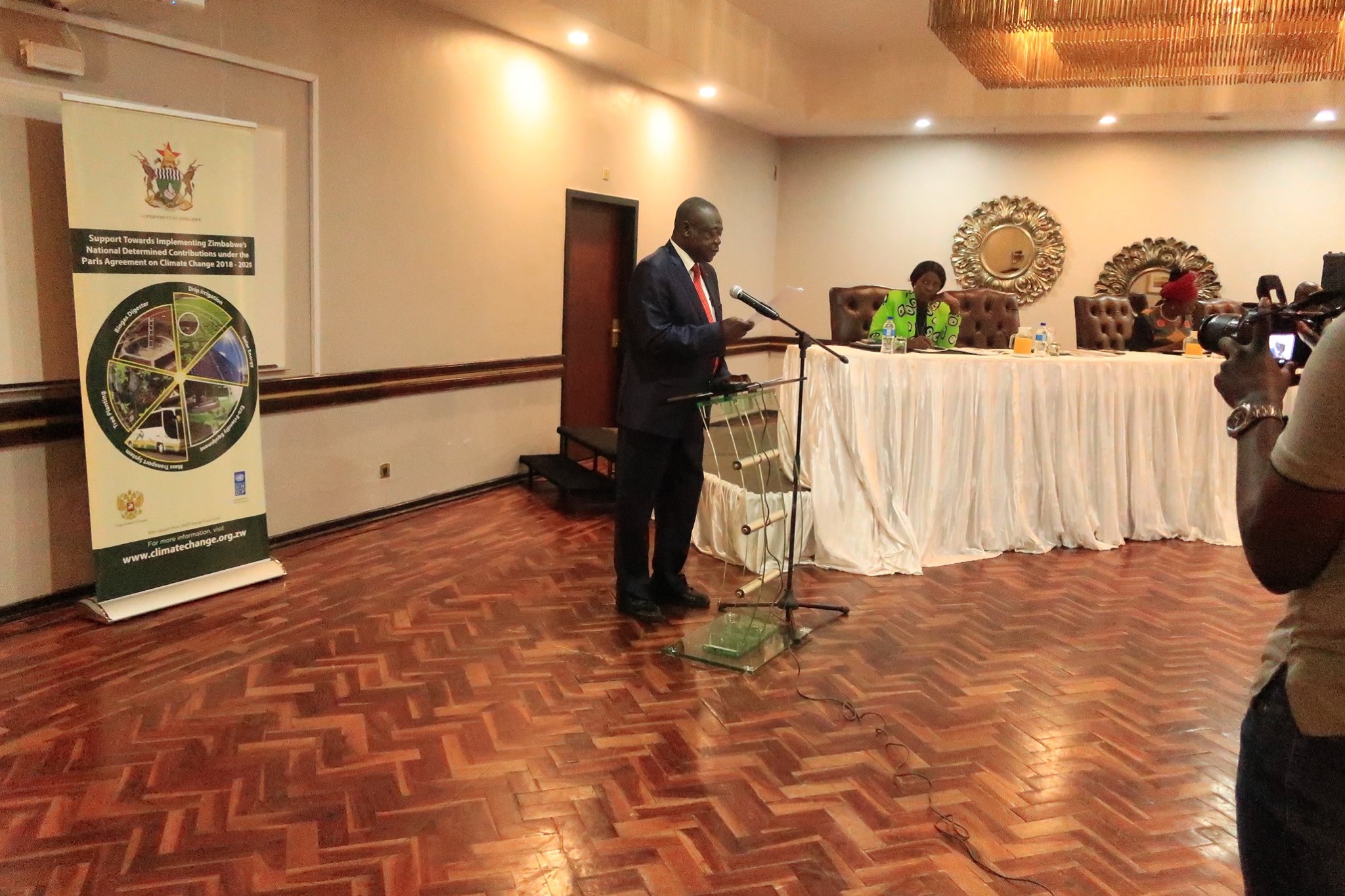By Joyce Mukucha
The Minister of Lands, Agriculture, Water, Climate and Rural Resettlement Rtd. Gen. Hon Perrance Shiri said Climate change was a cross-cutting issue affecting all socio-economic development sectors and urged line ministries to integrate climate change into their policy planning and budgeting frameworks as a way of mitigating the consequences.
He was speaking during the Inter-Ministerial Dialogue on Climate Change held in Harare on the 6th of September 2019 running under the theme, “Climate Change: Everyone’s Responsibility”.
The dialogue was on Zimbabwe’s national commitments to the Paris Agreement on Climate Change known as the Nationally Determined Contributions (NDCs) in which the country is expected to reduce its emissions by 33% per capita by the year 2030 in the energy sector.
The Government of Zimbabwe, he said, should be ready and abreast with the advantages and disadvantages of active participation in various climate change initiatives and urged ministries to understand their role in the recounting response and deliberately position the sectors they are responsible for.
“New economic opportunities are arising through a new global economy centred on renewable energy, climate smart infrastructure and agriculture, cleaner production systems and climate sensitive development planning. In order to orient the nations towards taking advantage of these opportunities and achieve a low carbon and climate resilient Zimbabwe, it is imperative for all ministries, agencies and arms of government to be conversant with the topic.
“Let me take this opportunity to inform you that the Secretary General of the United Nations, Antonio Guterres has called for a Climate Summit that is going to be held on 23 September 2019 in New York alongside the United Nations General Assembly. The discussions we are having here should be done with a view of informing The President, H. E. Cde E. D. Mnangagwa on the best direction the country should take in terms of climate action,” Minister Shiri said.
He reterated that the achievement of Vision 2030 requires concerted efforts and the global response to climate change offers a unique opportunity that the Government of Zimbabwe should take advantage of.
“Climate change affects all sectors. Every ministry official here present has a role to play in ensuring that all government programmes and projects are climate resilient. New investments should be able to withstand the extreme weather events expected to increase in frequency and magnitude in the future,” said Minister Shiri.
Speaking at the dialogue, the Climate Change Management Department’s Director, Mr Washington Zhakata articulated that global warming was one of the major causes for climate change pointing out that it is likely to reach 1, 5 degrees Celsius between 2030 and 2050 if it continues to be triggered.
He indicated that there was need for Zimbabwe to copy from developing nations in as much as adapting and fighting consequences of climate change were concerned. In terms of key political milestones, he emphasised that there was need for climate change investment funds.
“Developed countries are working together to find solutions to climate change. They have what is called Global Stock Take (GST) to check whether countries are on track to reduce emissions concerning trading of carbon credits. There was a stand-off over the question of carbon credits and carbon markets to reduce emissions. Rich nations often reduce their emissions by paying for carbon cutting projects in other countries. All socioeconomic implications in Zimbabwe call for appropriate technological measures and adaptation planning processes in our nation to ensure that we are able to mitigate climate change,” he said.
In support of the Paris Agreement on Climate, different stakeholders from various ministries who participated during the dialogue suggested that it was wiser for businesses in Zimbabwe to introduce clean energy technologies, improve energy efficiency and become carbon neutral. They suggested that making zero emission vehicles greener and cleaner, and moving towards cleaner generation of hydrogen and electricity can reduce emissions and enhance resilience to climate change.
Human activities are estimated to have caused approximately 1, 0 degrees Celsius of the global warming. As a result of climate change, Zimbabwe has lost many people to Tropical Cyclone Idai and lost over 100 people from floods in 2016/2017. Tropical Cyclone Idai, Deno, Eline, Japhet, heat waves, hailstorms, violent wind continue to destroy lives, livelihoods and property. In March 2019, Cyclone Idai struck Zimbabwe, causing extensive damage worth an estimated $622 million. Over 50, 000 households were destroyed, directly affecting 271,000 people including 60,000 who were displaced.






